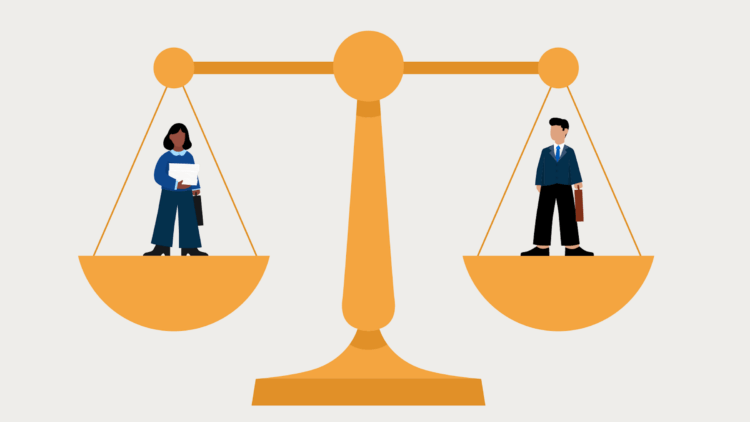What does it take to create a great client experience?
For legal clients, as in any industry, this means providing clients with exactly what they’re looking for, and delivering their legal experience in the most seamless, effortless way possible.
Lori Beight and Kristin Gaston understand this well. They’re the owners of Cascade Legal Planning in Portland, Oregon, and the winners of the 2019 Reisman Award for Excellence in Client Service. We spoke to Lori and Kristin at the 2019 Clio Cloud Conference to find out how investing in the client experience has led them to a profitable and successful practice.
Teresa Matich:
Cascade Legal was our Reisman Award winner for Excellence in Client Service. I’m wondering if you can define what does good client service and creating a good client experience mean to you?
Lori Beight:
I think it means making it easy for clients to get the help that they need and to get explanations for how things are going to be done—and when—with regards to their legal matter. In particular, I think for us as estate planners, removing barriers to getting into the office in the first place is important. People don’t want to come in and have those really challenging conversations about estate planning. They delay that work. So, a big part of it, I think for us, is making it fun—and it is fun actually. We love our work. And they’re really important conversations, so making it easier for clients to talk about it is fun for us.
Teresa Matich:
You said something really interesting there, about getting people what they need. Jack was talking about that in his keynote—the importance of product-market fit and connecting clients with the kind of experience and service that they want. How do you see that playing into what you do and your business model?
Kristin Gaston:
I would say it’s really important to be a good listener. Clients don’t always know exactly what they need when they come in, but they know how they want to feel when they’re done. So, if we can really focus on listening to what they’re concerned about, then we’re able to help them find the right solution. It all begins with just giving them an opportunity and a safe place to really allow us to listen to their story.
Teresa Matich:
And how important is empathy to that process?
Lori Beight:
Empathy is essential. It’s funny because one of the presenters today was talking about the importance of stories, and, in our work, stories are 100% of how we spend our time. We’re finding out about people’s families and their history and their hopes and their passions, and then helping them put together an estate plan that really reflects their values. So, being able to draw that information out does require a tremendous amount of empathy.
When you ask good questions to learn about someone’s life and the things that they care about and then you reflect back to them, “this is what I heard you say” or, “these are the things that I’m hearing you prioritize,” then they really feel heard—and then they know that you’re going to be able to put together a plan that’s going to work for them.
Kristin Gaston:
And I think the clients really understand and feel that as soon as they start working with us. We don’t want to “educate” them on what they need to do. But, by our ability to let them talk and find the right solution, it’s really all about us having empathy for their story—not us teaching them what they need to do.
Teresa Matich:
You’re both talking a lot about listening to people. Do you think that’s something that the broader legal industry misses? Do you think you’re doing something different here, or is that essential to the practice of law?
Kristin Gaston:
I think there’s been a shift. I personally have a colleague who’s introducing more listening-type elements in her teaching as a law school professor, and it was met with a little bit of resistance. But I think that it’s definitely been a shift for attorneys who are focusing on the client perspective to have the client really feel heard, and then they feel satisfied at the end, because they have been able to tell us what’s important and we can reflect back to them that we have heard them.
Lori Beight:
I will also say that listening to clients well is time-consuming. So, I think that’s one of the things that has been a barrier in a traditional law firm. Lawyers want to spend time telling the client about the law, and they don’t spend enough time asking questions and listening. And then the clients, if they’re being billed in six-minute increments, they’re watching the clock and they don’t want to pay more than they have to. So they’re not as forthcoming, they don’t want to spend a bunch of time talking about themselves and their situation. They want to be as concise and factual as possible, and so you miss a lot of what’s really important. We find something like flat-fee billing is one of the ways that we remove that barrier, so that clients and their lawyers can get to know each other.
Teresa Matich:
One of the big services that you offer your clients and that you talked about in your Reisman application was that you can create wills very quickly for end-of-life patients who haven’t thought of it ahead of time, sometimes in as little as 24 hours. How important is it for you to be able to provide that service?
Lori Beight:
I think that’s one of the most important things we do. It’s a small portion of what we do—we like to be more proactive and have plans in place for family as well before it comes to that. But to be able to be responsive to needs when someone is in crisis mode, that’s the highest level of satisfaction I think that we get in this job. We’re able to quickly and effectively put together a plan and get out and do a bedside signing for someone who is in hospice. Our whole team, I think, comes away from an experience like that really understanding how important this work is.
This is also where relationship is so important. If we haven’t spent the time getting to know them and the things that they care about, then when a crisis situation comes up like this, then you don’t have enough trust to developed to be able to say, “All right, well we have to do these two things,” without having to provide a big explanation about why those things are important. So, moments like that are really when building that relationship with the client pays off.
Kristin Gaston:
I would add to that, that sometimes the family has a sense that they need to do something right now and we can help them realize, “Okay, it’s not the time to do A-through-Z planning right now because you are going through a difficult emotional situation with your family. But if we could do one or two small things right now, that will make a lot of things easier, and it will give you some peace of mind and you don’t have all this worry that you didn’t do this before.” We can help them find the most important tools that they need for that moment and still have plenty of personal time with their family.
Teresa Matich:
You’ve really created this seamless process from end-to-end, from when someone first calls your office saying, “Hey, I have this problem. I have this loved one who is in this situation,” to when they get that final bill and it’s a flat fee. The whole experience is made to be painless for clients. What made you think through their entire legal experience in this way?
Kristin Gaston:
I think we just have a holistic perspective on the practice of law. Again, it just starts with building the relationship with the person, so that impacts how you first meet them and how you then carry that whole experience through to making it efficient and painless for them at the end. But it does really just start with building that relationship, and then everything else kind of builds around that.
Lori Beight:
It’s been a real transition in our practice though, because having that as a goal and having the tools to be able to do that are two very different things. So, I think for a long time we’ve understood the importance of being able to have empathy and create a holistic experience, but it’s only been in the last few years that we’ve really had the tools, and that’s extraordinary.
Teresa Matich:
Can you walk us through how you came up your process and client-service model?
Kristin Gaston:
I think we had to be willing to experiment. We had talked about the possibility, for example, of the efficiency of taking credit cards, and there are pros and cons to what we had heard about that. But at a certain point, you just have to give it a try. And as soon as you do that and you have clients saying, “Hey, that’s great, I can put miles on my Alaska Card. This is really convenient, I can pay right now.” You don’t know that until you try it, and then you hear from your clients that it’s working. If you sit too long with an idea without trying it, then you don’t have that feedback from the clients and from your team about whether that’s going to work. So, you do have to be willing to just kind of jump in and do a little bit of experimenting with different tools and different technology to see if it’s really going to increase your efficiency and make this process better for the client, or whether its an idea you need to throw out the window.
Teresa Matich:
And do you update your process based on feedback from your clients often? Do you actively solicit feedback from your clients?
Lori Beight:
Yes, I would say we update our process really frequently based on our own experience, what we’re hearing, and the staff experience. We have weekly meetings and we sit down and we talk about what’s working and what’s not working. And then we set aside time for strategy sessions where we sit down and ask, “What does our intake process look like?” or, “What does our design sheet or our checklist look like?” And then we collaborate on how to tweak it and make it better.
Kristin Gaston:
And with that too, even the decision to go flat fee, that’s something we revisit often just to make sure that the service that we’re providing matches the fees that we’re quoting. If we’re adding new services, are we appropriately charging the right fixed fee for that? So, that’s a continual topic to revisit.
Teresa Matich:
Absolutely, because the way that you’re able to help these clients is to stay in business and ensure that things are profitable and efficient, and that you’re creating a good experience for your staff as well. So, how has this drive towards creating an amazing client experience impacted the success of your law firm?
Lori Beight:
We have happy clients and over 60% of our new clients are referred by old clients. So, I think it builds on itself, absolutely. Your reputation is really how you build a practice.
Teresa Matich:
Yeah, and reputation is so important in the legal industry. I always hear referrals being such an important part of many law firms. Do you ask clients to refer you, or do they do that of their own accord?
Kristin Gaston:
We sort of do. It’s not a formal request. Often we’ll say, “If you had a great experience, you can share our name with your friends and family.” But we find that they’re doing that anyway. And I think it’s that experience that they’ve had that makes them want to tell friends and family about us. That’s so important.
Lori was talking about barriers earlier. If you know you need to do something because for so long you’ve heard someone say, “You need to have a will, you need to have a trust,” but you just don’t know where to start, and you ask your neighbor or someone in your community, or your book club, or your community group, and someone says “Oh, I have this great woman I went to and she was really easy to work with, and her team is really great, and it was easy to get in and take care of the work and …” That says it all, and you don’t have to start from scratch with a Google search or some other thing. You’ve just got a nice warm referral from someone who had a great experience—that’s what makes a difference.
Lori Beight
I had two funny experiences last week. I had one client who, a friend of his had inquired on Facebook, “Hey, we need to get a will done. Who should we use?” They’re not even in our state, and my client writes back, “Oh my gosh, you should come here because I have this awesome estate planner and you would love her.” Now, nevermind, I’m not going to be able to help that person, but he’s broadcasting it out there. “I have this estate planner and I love her. If you need that help, then call me because I’ll hook you up.” Which was awesome.
The other one was, we had gotten a referral and it was the sister of somebody that we had already worked with. She sent a message and said, “Oh my gosh, I’m sick. I can’t come in.” And I called her and I said, “I just wanted to check-in. Are you okay? I’ll have Esther call to reschedule with you. Looking forward to meeting you.” And I still haven’t met her, but she’s already referred somebody to us.
Teresa Matich:
Wow.
Kristin Gaston:
Yes, and I think that speaks to the experience that they have with our team, including scheduling a consultation, reaching out and getting the information, and even first getting connected right away. I had a similar experience with a same-sex couple that is trying to decide whether they want to get married before they do their estate plan or not. And in the meantime, we had a phone call to talk about some introductory matters. They’re going to wait and they’re going to get married. But, in the meantime, one of them referred her sister to us. So there is a lot of that really important time before clients even come in where they are having an experience with your firm that can be positive and impactful to them—enough that they’ll refer you to someone else.
Teresa Matich:
How important is the first impression when you first meet one of these clients, in terms of sparking these relationships and being able to create that trust?
Kristin Gaston:
The first meeting? I think, kind of harking back to what we said at the beginning, we do ask them to send us some information ahead of time so we have a little bit of framework to understand their family. Are they single? Do they have minor children? What essential information we will be collecting from them. But we also ask them, “What brought you in today?”
Maybe they just lost a loved one, or they had a friend who lost a loved one and they had an experience that could have been better if there had been some planning around it. That really is important to understand—whether they had a really positive experience and they want to replicate that, or they had a negative experience and so they’d like to do something different so that they can leave a legacy for their kids in a way that is really straightforward and not as emotional and easy to understand. So, just that first meeting, having them come in and again, letting them tell the story of why they’re there and what they hope the outcome will be, allows us to help them get there.
Lori Beight:
The first meeting is when they decide whether or not they’re going to work with us. That’s pretty important.
Teresa Matich:
Absolutely. Your website is also very clear, you have your fees listed right there and what’s included in the plan and everything. Did you put a lot of work into that as well?
Lori Beight:
Yeah, yeah. Again, I think because our value is to make sure that people are making an informed choice, it’s important that they know about fees up front. And we do feel like it’s not an especially transparent field, the legal field. So, it is a way that we differentiate ourselves.
Teresa Matich:
And how does having this focus on client service impact the internal cultural and morale at your office? How does it feel working at a place that you know provides these great experiences to people?
Lori Beight:
We’re happy. We have people who are happy, and we feel like the work is meaningful. Clients leave happy. I think they come in a little bit anxious and they leave with hugging us. It really is a very personal experience. It’s very satisfying work.
Teresa Matich:
Based on your experience, what number one advice would you give to other firms who want to improve their profitability and growth by improving the client experience?
Kristin Gaston:
I would say you have to see your experience, you have to see your process from the client’s perspective, and it can be really hard to do that without a conscious dissection of the process because we’re so used to seeing it from our side. How could this be faster for us or how can we improve it from our perspective? But you really have to sit on the other side of the table and see every step of the way from their perspective, and that will undoubtedly improve some aspect of your process so that the client feels like they had responsiveness when they needed it and they were heard when they needed to be heard.
Lori Beight:
I would agree with that. I think you really just have to be client-centered.
Teresa Matich:
Absolutely. Are there any stories of people you’ve helped that really stick with you where you were able to provide them a good experience that maybe really significantly helped them through a difficult time?
Lori Beight:
We had an open house recently, and I had a client come in—it was a couple for whom I had created a supplemental needs trust for their disabled adult son. They were really excited that we were having an open house, because it was a way for them to bring him in and they could tell him it was a party. So, they brought him to the office and then they introduced him to me, and they introduced me by saying, “This is the woman who’s helping us to make sure that if anything ever happened to us that you’re taken care of.” That felt amazing.
Teresa Matich:
Amazing! It seems like sometimes the perception is that providing a great client experience is too expensive. Whether in terms of time or effort or energy, the perception is it’s going to take away from your law firm profitability. I wanted to get your thoughts on that, because at least from my perception, that seems like that’s not the case at Cascade Legal at all.
Lori Beight:
Some things aren’t worth the money. I will say that, but if you’re thinking about ways to improve efficiencies and to provide better work faster for your clients, the tools that you need to do that are worth the investment. I think one of the things when we were first practicing, we found it was really stressful having to sort of create everything from whole cloth. You would have really sort of bare-bones tools, but if you were customizing a document, you had to create it new or you had to go out and research things like, “What clauses can I insert here?” It was stressful. You just weren’t ever really sure it was going to be consistent all the way through. God forbid you’re in a traditional firm where they’re still doing find and replace in their documents. I do not get that at all.
The ability to be able to put together a plan, to have confidence that it’s really good, and to be able to do it really quickly and consistently is money really well spent. It’s not only good for the client, that’s good for us. That’s good for everybody.
Kristin Gaston:
Absolutely. There was a quote in a session yesterday, about how if you’re focused on making the money, you’re not going to be profitable. If you’re focused on the client experience, you’re going to be profitable.
Teresa Matich:
That’s true, and that’s so essential. Do you have anything else you’d like to add?
Lori Beight:
One of the things I love about being a lawyer is all the different ways that you can use a law degree. I think if I had to say anything, if you’re not happy with the practice that you’re in, do something else. You can still use your law degree to be helpful in so many ways. I think that the level of dissatisfaction still in our profession is really worrisome. But it’s also a good time to be a lawyer.
Kristin Gaston:
Yeah, I would say that there’s technology available now to create a unique kind of law firm that can work for the younger generation—flexible work schedules, virtual possibilities, the use of social media and technology to reach out to clients. You can be really creative thinking about what you want your practice to look like. And that I think is really exciting for people that are coming into the profession.
Teresa Matich:
Absolutely. Thank you so much for joining me.
Kristin Gaston:
Thank you.
Lori Beight:
Thank you.
We published this blog post in September 2020. Last updated: .
Categorized in: Business









